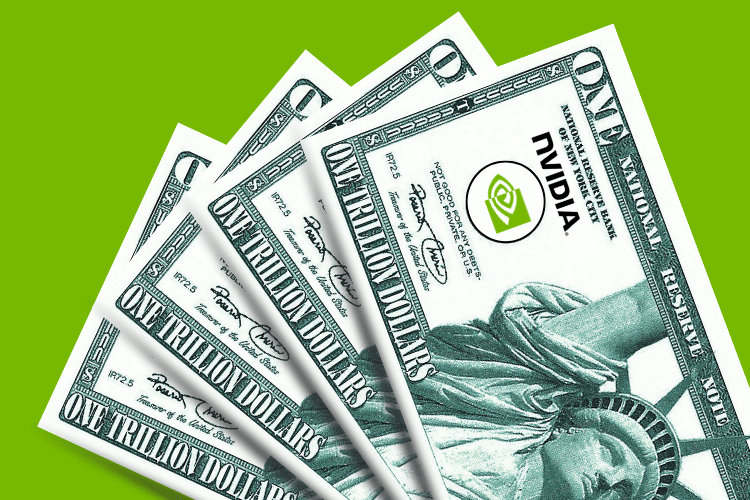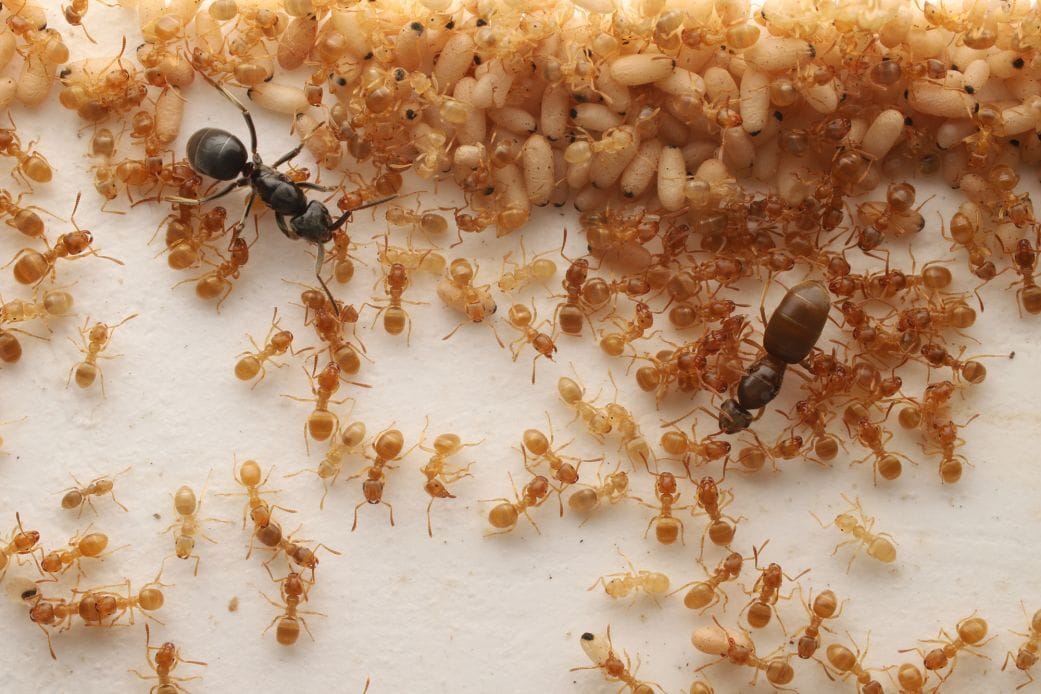
Nvidia might be too big to fail… at least for now

Designed by NextGen News
Just don’t blame me if the bubble pops. Nvidia, whose chips sit at the center of the global AI boom, delivered an exceptional earnings report on Wednesday, temporarily alleviating concerns of a potential economic implosion.
There's been a lot of talk about an AI bubble. From our vantage point, we see something very different,
Better than ever
With investors, analysts, and laymen alike anticipating a possible bubble amid the massive AI craze, Nvidia had to put up prime Lebron numbers to dissuade the disbelievers… and they did just that:
Nvidia reported Q3 revenue of $57.01 billion, beating forecasts of $54.92 billion.
Data-center sales hit $51.2 billion, above expectations of $49.09 billion, highlighting that there’s still a strong demand for AI.
The company expects to rake in $65 billion in revenue this quarter, again surpassing the $61.66 billion analysts anticipated.
Jensen Huang, Nvidia’s CEO, said sales of the company’s next-gen Blackwell chips are “off the charts” and cloud GPUs are “sold out,” topping off an already spectacular quarter for the world’s most valuable company.
Finally, some good news: The results come after weeks of AI stock selloffs and comparisons to the late-1990s dot-com bubble, but Nvidia’s strong performance helped ease anxiety (for now) that the rapid expansion of the AI-hardware market could be slipping into bubble territory.
What’s all this bubble talk?
Let’s do a brief recap. Since late 2022, the S&P 500’s record rally has been driven largely by the “Magnificent Seven,” which are responsible for roughly 75% of the index’s gains.
Some members of that group, including Amazon, Alphabet, and Meta, represent more than 40% of Nvidia’s revenue.
At the same time, companies like OpenAI, Nvidia, CoreWeave, AMD, Microsoft, and Oracle are tied together through a circular web of multibillion-dollar investments (see visualization).
Some think it’s a recipe for disaster: The tight loop of investment has fueled worries that if the big tech companies (and the AI firms driving most of the spending) scale back their AI ambitions, it could set off a damaging chain reaction across the economy.

Bangladesh court sentences former Prime Minister to death

Oli Scarff / Getty Images
The verdict marks a significant shift in the country’s political landscape. Early this week, Bangladesh’s domestic war crimes court handed down death sentences to former Prime Minister Sheikh Hasina and her home minister, ruling them responsible for last year’s violent crackdown on student-led protests.
Why sentence them to death?
Officials said the punishment reflects Hasina’s responsibility for the government’s violent suppression of mass protests that opposed public-sector job quotas. According to court documents:
UN estimates say more than 1,400 people were killed and thousands were injured by government security forces.
Hasina and her former home minister, Asaduzzaman Khan, ordered the use of military-style force, including drones and helicopters, against unarmed protesters.
After deliberation, the court deemed Hasina and Khan were guilty on multiple counts of crimes against humanity and sentenced them to death. Meanwhile, a former police chief who cooperated with prosecutors was handed a five-year sentence.
How did the protests start? Unrest erupted after a 2024 court ruling restored government job quotas for descendants of 1971 freedom fighters, but even after most quotas were scrapped, it evolved into broader frustration over limited private-sector jobs, high unemployment, and rising prices.
Looking forward: Hasina and Khan, who have been living in exile in New Delhi since August 2024, dismissed the verdict as politically biased. As of writing, India has not granted Bangladesh’s request to extradite them.

Scientists find ants use “chemical warfare” to take over kingdoms

Current Biology
It’s the first time the phenomenon has ever been documented. New research revealed parasitic ant queens can take control of another species’ colony by using chemical signals that manipulate workers into assassinating their own queen.
Game of pheremones
The study, released this week (read here), is the first to show how a newly mated queen species manipulates worker ants into performing lethal tasks, and it plays out like a Shakespearean drama:
First, the parasitic queen masks her scent and sprays a substance (believed to be formic acid) onto the host queen.
The chemical disguises the host’s scent to her own worker ants, making them perceive her as an intruder and a threat to the nest.
The workers then attack and kill their own mother, allowing the parasitic queen to take over the colony (watch the process here).
From there, the parasitic queen assumes control of the nest, lays her eggs, and is cared for by the workers of the former host, taking over the entire colony in only a few hours.
The ant kingdom is a brutal one: Research shows that ants sometimes commit matricide by killing their own queen and biological mother when she is no longer fertile, and invading queens have been observed committing regicide, eliminating rivals by beheading or biting their throats.
In partnership with Roku
Shoppers are adding to cart for the holidays
Over the next year, Roku predicts that 100% of the streaming audience will see ads. For growth marketers in 2026, CTV will remain an important “safe space” as AI creates widespread disruption in the search and social channels. Plus, easier access to self-serve CTV ad buying tools and targeting options will lead to a surge in locally-targeted streaming campaigns.
Read our guide to find out why growth marketers should make sure CTV is part of their 2026 media mix.

Baby Shark is now officially on the stock market

SeongJoon Cho / Bloomberg via Getty Images
Sorry for getting the song stuck in your head. Pinkfong, the South Korean studio behind the global hit “Baby Shark,” went public on Seoul’s Kosdaq market this week, raising 76 billion won (~$53 million) in its IPO.
One for the books
Depending on who you ask, “Baby Shark” is either the perfect tool to keep kids entertained or the bane of musical existence. Regardless, there’s no disputing the fact that it’s a global earworm:
The viral hit has racked up over 16 billion views on YouTube, the platform’s most-watched video ever.
It also charted on Billboard’s Hot 100 and even reached No. 1 on Spotify’s Global Viral 50.
Building on its breakout success, Pinkfong broadened its strategy by creating new characters, franchises, games, and live productions, eventually transforming into a full-fledged intellectual property studio.
Investors liked that
Aiming to expand beyond just toddlers’ screens and viral hits, the South Korean studio wants to prove its capable of transforming into a global entertainment brand. However, Pinkfong needed more money to pair with its heightened ambitions, so it went public:
Shares jumped as much as 62% before leveling off near 41,550 won (around $28).
The listing valued the company at about 596 billion won ($406 million), so it’s safe to say investors have faith in the inevitable “Baby Shark” cinematic universe that’s soon to come.
As for the future… look to see a lot more “Baby Shark”. The company is looking to use AI and big-data tools to quickly expand into new IPs, more premium animated content, and international pop-up stores.

Say hello to the world’s most expensive modern artwork

Alexi Rosenfeld / Getty Images
Hurry! Act like you know who Edmund Leighton is and grab some wine. After three sluggish years in the auction world, Sotheby’s just hammered down a record-breaking sale that might hint at a revival among high-end collectors.
Bidding war
After a competitive, roughly 20-minute bidding session, a Gustav Klimt portrait named “Portrait of Elisabeth Lederer” sold for $236.4 million to an anonymous buyer. It’s an unprecedented sale for modern art:
The painting is the most expensive work ever sold at Sotheby’s and the most expensive 20th-century artwork ever auctioned.
It also became the second most-expensive piece ever sold at any auction, behind only Leonardo da Vinci’s “Salvator Mundi”.
The six-foot painting, completed around 1914–16, also has a complex wartime history, as it helped its subject Elisabeth Lederer, who was a Jewish woman, avoid Nazi persecution.
A piece of history
How does a painting help one escape the Nazi’s, you might ask? Before the Nazi invasion of Austria, the Lederers were among Vienna’s wealthiest families, and they seized much of their art, sparing only family portraits.
Thinking quickly, Elisabeth claimed she descended from the non-Jewish artist Gustav Klimt, ultimately avoiding persecution. Learn more about the painting’s history here.
Due to its historical significance, the sale of Klimt’s painting was one of the headline lots in an evening that also featured many other major works and renewed demand for rare modern masterpieces.
However, not all of them were masterpieces, per se: One of the more provocative artworks (if you can call it that) was a fully functional 18-karat gold toilet, named America, that sold for about $12.1 million.
How did you like today's newsletter?


GIF via GIPHY
> Raccoons in major US cities have developed noticeably shorter snouts than rural populations, which experts say is a surefire sign of self-domestication.
> Scientists built a digital copy of a mouse brain using a supercomputer, which will examine nearly 10 million neurons and 26 billion synapses, to study brain diseases and test treatments virtually.
> Thai police stopped a car near the Cambodia border and arrested two men after finding 81 live monkeys and crystal meth stashed in the vehicle.
> Record numbers of young women—around 40%—say they want to leave the US permanently, nearly four times the amount recorded in 2014.
> Scientists have created a breakthrough diabetes treatment that can deliver insulin through a skin cream, offering a possible alternative to injection-based treatments.







